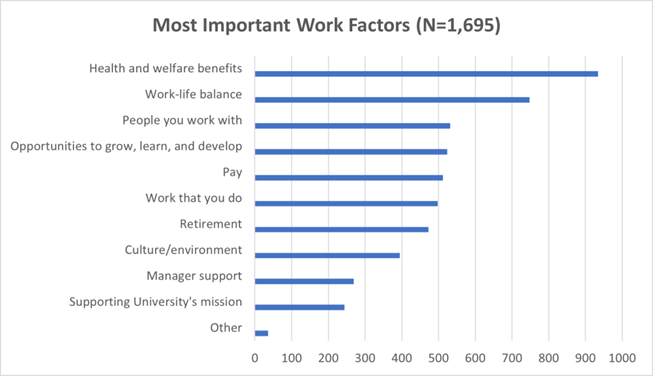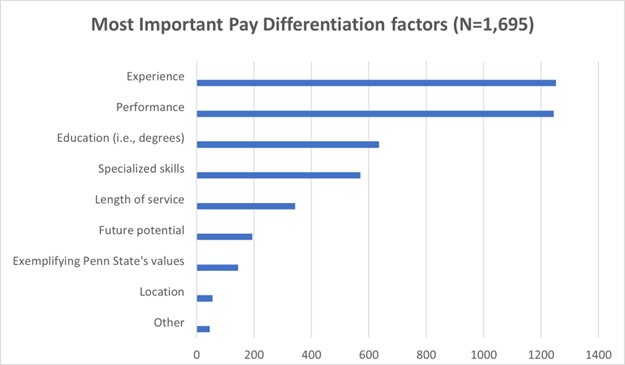Focus Group Results
Staff and Manager Discussion Themes
In December 2020, HR’s consulting partners hosted four virtual staff and manager focus groups using the Remesh platform, a live focus group tool that can host hundreds of participants. This page shows a summary of feedback.
Engaging in these focus groups has given HR insight into aspects of career development and compensation that staff members and managers are both happy and unhappy with. These perspectives are essential as HR works on improvements to address concerns and provide a more supportive and transparent set of career and compensation structures. While the project team will rely on focus group results to build new structures and processes, HR cannot guarantee the complete resolution of all reported concerns.
All statements on this page are based on perceptions and experiences of our staff and manager participants and do not necessarily reflect official views of the University.
Penn State’s Employer Value
The following chart depicts the most important work factors to focus group participants. The top three factors reported were health and welfare benefits (medical, dental, vision, employee assistance program, etc.), work-life balance (flexible schedules, part-time schedules, remote work, etc.) and the people participants work with.

Talent Markets and Labor Pools
Managers mentioned the following recruitment markets:
- Local or regional geographic area
- Other areas or campuses within Penn State
- Organizations/associations with specialized skills
- National, for a larger more diverse market
Commonwealth campuses participants are more focused on recruiting from their geographic area, but more rural locations may have less available talent.
Classification and Career
Participants’ sentiments on career and development opportunities are mixed. A significant portion of participants feel there are opportunities to grow within their current role or to move laterally, more so than opportunities to move upward. Most upward opportunities often require a change in area, job family, campus, etc. There is more perceived room for advancement at University Park compared to Commonwealth campuses.
Career and development opportunities vary by role or area. Some staff members are unsure what career opportunities are available and feel they must seek opportunities themselves. Managers may not receive enough training on how to have career and development conversations with their staff.
Primary suggestions to improve career and development opportunities include:
- Allot additional funding for training and development;
- Increase available time to participate in career development;
- Clearly define career paths, levels, and job descriptions, and;
- Create a clear and consistent promotion process across University and increase opportunities to promote from within.
Compensation
The following chart depicts the most important factors that focus group participants feel should determine a staff member’s pay. The top three factors reported were experience, performance, and education.

Staff and managers generally feel underpaid relative to:
- The external market, both in high education and general industry;
- Their experience levels, and;
- The level and amount of work they do.
Staff generally feel starting salaries are acceptable, but small pay increases lead to less competitive pay over time.
Most participants do not understand various aspects of the current compensation program. Staff feel the salary bands are hard to understand and use, and it is unclear how pay is set.
Primary suggestions to improve the compensation program include:
- Increase autonomy/flexibility for managers or specific areas to provide input on compensation decisions;
- Increase clarity and transparency in how the program works and how decisions are made, and;
- Create resources and training, such as scripts, for managers to have pay conversations with staff.